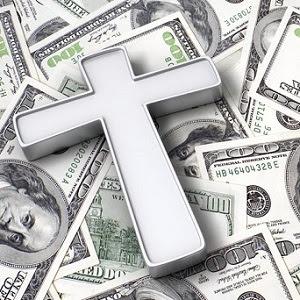 (The image at right was found) at blindgossip.com.)
(The image at right was found) at blindgossip.com.)The $2.2 trillion bill passed to help the economy contained about $350 billion earmarked for small businesses. The money is in the form of loans from banks, and was meant to help these businesses survive while shut down during the current epidemic. If a business kept 75% of their pre-shutdown staff on the payroll, they wouldn't have to pay the loan back.
It was a good idea, but is off to a rocky start. Some, if not most, of the small businesses are finding it difficult to access the money -- our to confusing instructions to banks.
Now those small businesses will run into another problem. In a move to prop up Trump's evangelical base, his administration has changed the rules for small business loans. Normally, religious institutions (churches, synagogues, mosques, etc.) cannot qualify for the loans. But the new loan program has changed the rules, and those religious institutions can apply (and receive) loans meant for small businesses.
The following is from the Small Business Administration website:
We additionally clarify that faith-based organizations are eligible to receive SBA loans regardless of whether they provide secular social services. That is, no otherwise eligible organization will be disqualified from receiving a loan because of the religious nature, religious identity, or religious speech of the organization. The requirements in certain SBA regulations—13 C.F.R. §§ 120.110(k) and 123.301(g)—impermissibly exclude some religious entities. Because those regulations bar the participation of a class of potential recipients based solely on their religious status, SBA will decline to enforce these subsections and will propose amendments to conform those regulations to the Constitution. . . .
In particular, loans under the program can be used to pay the salaries of ministers and other staff engaged in the religious mission of institutions. . . .
Simply put, a faith-based organization that receives a loan will retain its independence, autonomy, right of expression, religious character, and authority over its governance, and no faith-based organization will be excluded from receiving funding because leadership with, membership in, or employment by that organization is limited to persons who share its religious faith and practice. . . .
Receipt of a loan through any SBA program constitutes Federal financial assistance and carries with it the application of certain nondiscrimination obligations. Any legal obligations that you incur through your receipt of this loan are not permanent, and once the loan is paid or forgiven, those nondiscrimination obligations will no longer apply.
Small businesses pay taxes -- lots of taxes. Religious institutions don't. Small businesses hire most of the people in the U.S. civilian workforce. Religious institutions hire very few people. Saving small businesses make sense for our ailing economy, because they will pay back by paying taxes and keeping millions of Americans employed. But allowing religion, with it's many thousands of churches (and others), to soak up billions of the dollars meant to save the economy doesn't.
This giveaway of federal money to religions also poses a constitutional question. While the Constitution guarantees religious freedom, it does not allow any religion to be favored over another, or religion in general to be favored over secular peoples. Every American will be required to pay this money back through taxes -- and non-religious individuals should not have to help pay for religions to receive a government handout.
This is one more really bad idea put forth by the Trump administration!

